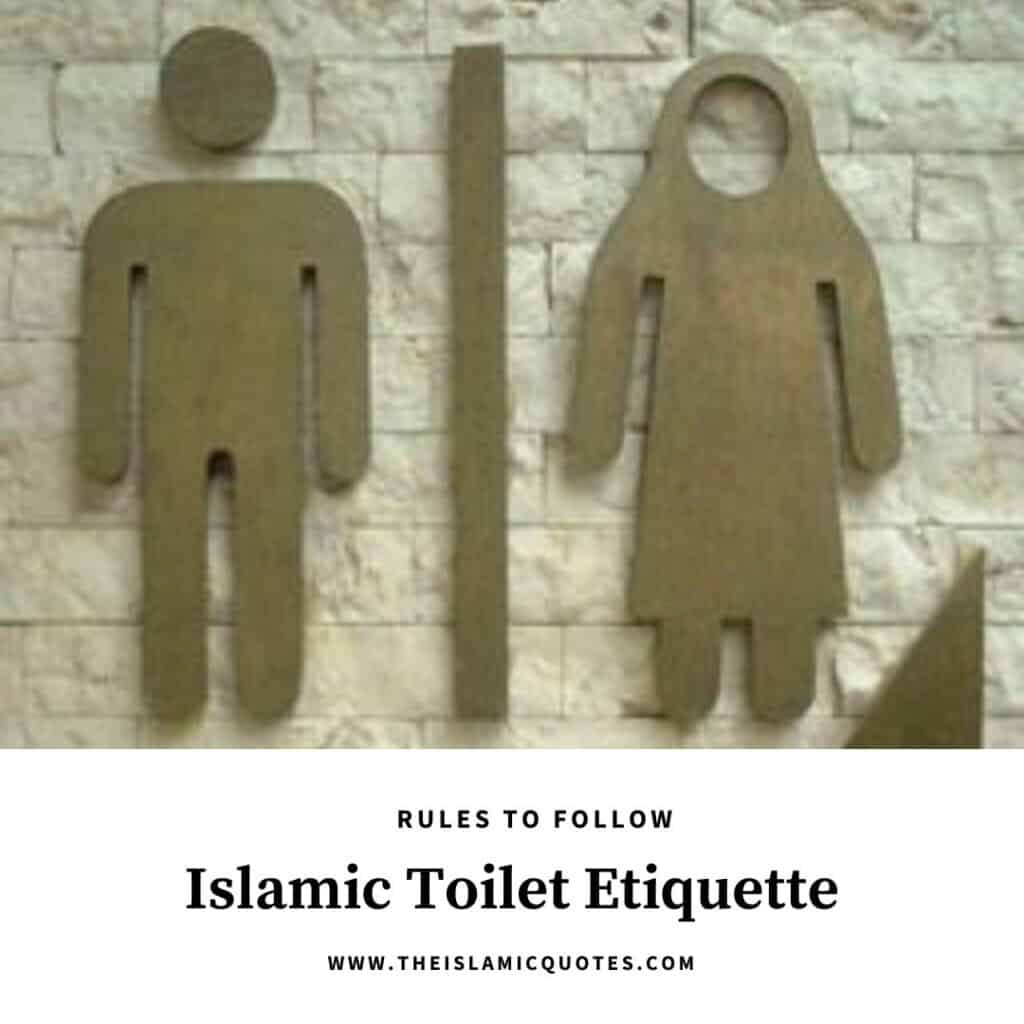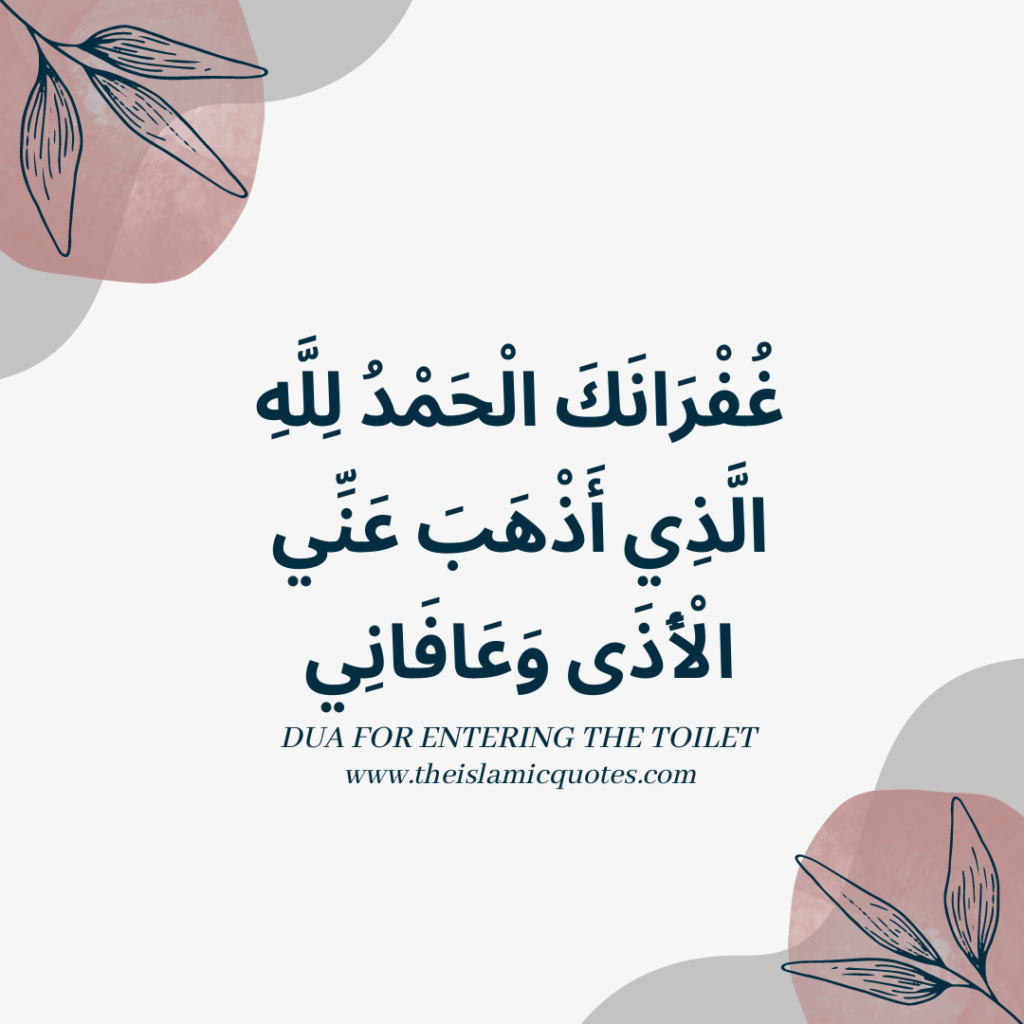Islamic Toilet Etiquette: Toilet etiquettes refer to a series of hygienic rules and standards established for the purpose of going to the toilet. Since, in Islam, there is a special emphasis on purity and cleanliness, toilet etiquettes hold special significance.
In fact, cleanliness is equated to completing half of an individual’s faith.
What are the Toilet Manners for Muslims?
With respect to Quranic verses, little information is present on the topic at hand. As, Muslims are simply guided to wash before they pray, visit the toilet or come in contact with the opposite gender. Hence, most information on Islamic toilet etiquettes is directly obtained from the hadith and Sunnah’s of Prophet Muhammad (SAW).

19 – Visit The Toilet Only When Necessary
Muslims are guided to access the toilet area when it is biologically necessary. Meaning, unnecessary trips to the toilet should be avoided since the area is generally unhygienic and sinful due to the presence of Shaitan.
18 – Do Not Carry Anything with The Name of Allah
Before visiting the toilet, it is critical to not be carrying anything with the name of Allah. Which includes, the Quran, books on its interpretations, and jewelry with Allah’s name.
17 – Enter The Toilet with The Left Foot First
Moving forward, Muslims are asked to enter the toilet area with their left foot first. Before entering, you must read the dua that is for entering the toilet too.

16 – Exit The Toilet with The Right Foot
The followers of Allah are guided to leave the toilet with their right foot since they are leaving a dirty place, and with that – the Muslims are also advised to read the dua for exiting the toilet.

15 – Stay Silent While in The Toilet
Muslims are further guided to practice silence whilst they are in the toilet area. Meaning, they are not allowed to talk, read, sing songs or have conversations with other individuals.
14 – Avoid Eating While in The Toilet
Moving forward, Muslims are also strictly asked to avoid eating while they are in the toilet. As the area is dirty and it can be hazardous for the health too.
13 – Practice Istinja and Shattaf In The Toilet
Istinja refers to the practice of cleaning yourself after visiting the toilet. This falls under the jurisprudence of Islamic hygiene and is obligatory for all Muslims to follow. The obligation lies in the fact that it ensures sanitation and cleanliness. However, Muslims can also carry out the conduct of Shattaf. Shattaf refers to cleaning oneself through a water spray.
12 – Cover Private Parts After Cleaning
In order to keep modesty into account, Muslims are guided to cover their private parts after cleaning themselves through Istinja or shattaf. This factor will preserve the modesty and purity of individuals, and prevent them from becoming a victim to sinful eyes
11 – Recite Prayer Before Entering the Toilet
Muslims are guided to read the following prayer before entering the toilet: “Allahumma innee a’oodhu bika minal khubthi wal khabaa-ith.” In this manner, the sinful attributes of the toilet are removed, and the Muslim can visit in peace.
10 – Recite Prayer After Exiting the Toilet
Muslims are guided to read the following prayer after exiting the toilet: “Alhamdu-lil-laa-hil-la-dhi adh-haba’anil a-dhaa wa ‘a-faa-ni”. Through this, the Muslim will not carry the sinful traits outside the toilet with him/her.
9 – Avoid Facing the Qibla And Turning Your Back On It
Muslims are guided to not face the Qibla while they are urinating for defecating. Moreover, they are also forbidden to turn their back towards the Qibla during this conduct. In this manner, the purity of the Qibla is preserved.
8 – Use Fingers and Water For Cleaning
Adding on, the followers of Islam are guided to clean their private parts with their hands. However, if filth remains, they are guided to use water too.
7 – Clean Thoroughly
Whilst cleaning, Muslim men are guided to wash from back to front, while women are guided to wash from front to back. In this manner, no filth will remain and cleanliness will be ensured.
6 – Use Cloth or Toilet Paper for Cleaning
Muslim individuals are told to dry themselves through cloth after visiting the toilet. They can however use toilet paper in the absence of cloth too. Nevertheless, any other type of paper is not allowed to be used.
5 – Practice Istibra
After visiting the toilet, Muslim men and women are guided to practice the conduct of Istibra. Which refers to not leaving any drops of urine on the urethra. This can be done by, lying on the left side of the body, coughing, or simply walking. In this manner, individuals can feel at ease about the absence of filth in their system.
4 – Avoid Urinating While Standing
In Islam, Muslim men are guided to avoid urinating whilst standing, unless it is extremely critical to do so. The notion of avoiding comes from the fact that splashes of urine can land on the body, making the individuals impure. Hence, spare clothes should be kept alongside if there is a critical need to urinate while standing.
3 – Wash Hands After Visiting the Toilet
Individuals are guided to wash their hands after using the toilet. In this manner, any impurities are removed from the hands, and the person becomes pure. It has links with one’s health too, as cleanliness is a bystander for one’s health too.
2 – Avoid Urinating in Water, Cemetery, Road, Or the Wall Of A Mosque
A mosque is a holy place for a workshop, hence urinating on a pure land should be avoided. Moving forward, whilst respecting the dead ones, this conduct should be avoided in the cemetery too. The road is used for people to walk plus travel on, and any form of filth and affects the process. As a result, urinating on roads should be avoided. Lastly, water is used to drink by all individuals, and drinking filthy water can have negative health consequences. Hence why, urinating in any form of water should be avoided, especially, streams.
1 – Using Stones Is Acceptable for Cleaning Private Parts
In the event of lack of access to water, Islam has allowed individuals to clean their private parts with stones and other related objects. As they carry the capability of cleaning filth too.







Hi, could you please share your quranic/hadith sources for this information if possible?
Hi pls ifound this helpful but i need you to share more Hadith and Quranic verses about the topic
Salam Rashoy,
We only wanted to add authentic hadith so there was a limited number of them. If there’s any that you feel we missed out, do let us know and we will update the article.
I would also request that you visit our Islamic forum to engage in Islamic discussions.
Team TheIslamicQuotes
Using the toilet.. of muslim public CR
One of the person notice that im drunk
I pee famale Cr… He react angry
Im sorry to him.. but he still angry like a shir
Jazakallahu khairan